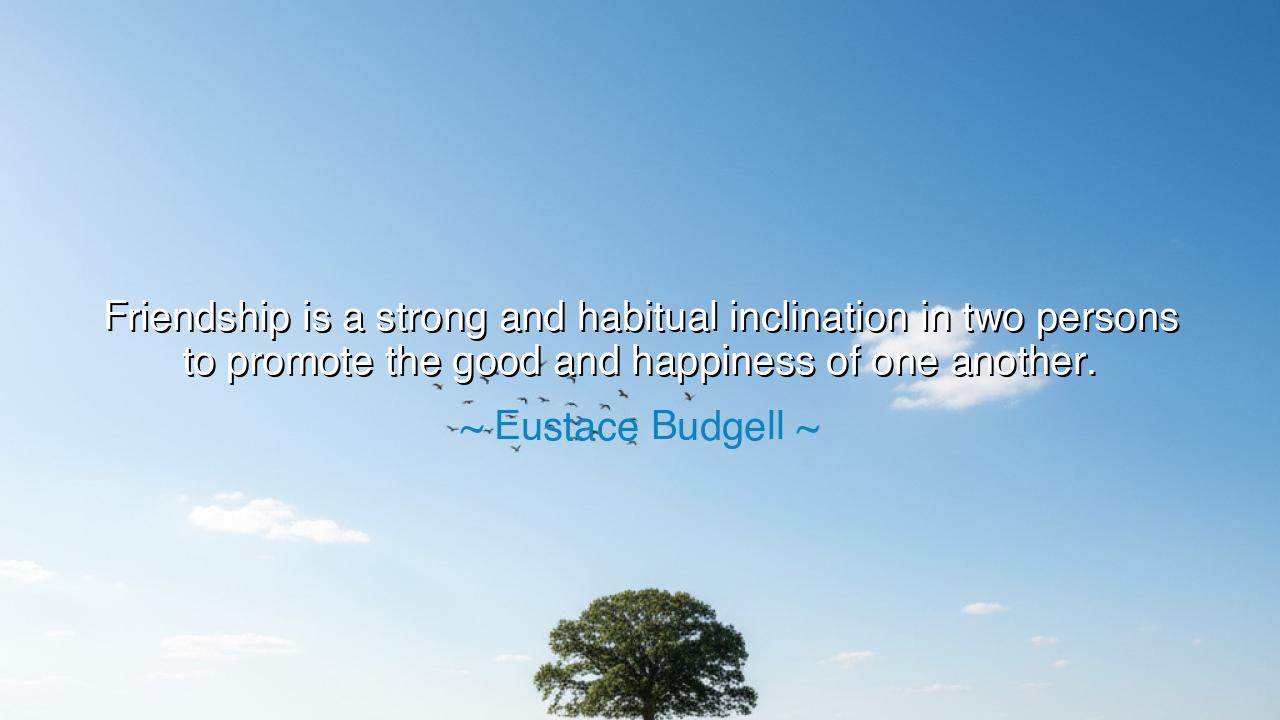
Friendship is a strong and habitual inclination in two persons to
Friendship is a strong and habitual inclination in two persons to promote the good and happiness of one another.






"Friendship is a strong and habitual inclination in two persons to promote the good and happiness of one another." Thus wrote Eustace Budgell, a man of letters from an age when words were weighed like gold and virtue was a thing to be cultivated, not claimed. In this gentle yet profound saying lies the eternal law of human fellowship: that friendship is not born merely of convenience, nor of fleeting affection, but of a steady and sacred resolve — a habitual inclination — to do good to one another, body and soul. It is not passion, which burns and fades, but constancy, which endures and strengthens with time.
In the ancient world, the philosophers of Greece and Rome spoke often of friendship, calling it the purest bond that mortal hearts could know. To Aristotle, it was a “single soul dwelling in two bodies.” To Cicero, it was the crown of virtue, the refuge of the weary spirit. But Budgell, with the quiet grace of an English moralist, revealed another truth — that friendship is not a rare lightning strike of emotion, but a discipline. It is a practice, refined daily by kindness, patience, and mutual care. It does not simply happen; it is built, stone upon stone, through deeds that promote the good and happiness of the other.
Let us look to an example from history: the bond between Jonathan and David, in the days of the ancient kings. Jonathan, the son of Saul, saw in David not a rival, but a friend whose heart was pure and whose destiny was blessed. Though David’s rise threatened Jonathan’s own crown, love triumphed over envy. Jonathan protected David at great cost, warning him of danger and pledging his loyalty even as the throne of his father trembled. He said, “Whatever thy soul desireth, I will even do it for thee.” Such was the habitual inclination of friendship — to seek not one’s own advantage, but the safety and joy of the other. And when Jonathan fell in battle, David wept not as a king mourning a prince, but as a brother who had lost a part of himself.
This story, though ancient, carries the pulse of Budgell’s truth. True friendship is not a fleeting sentiment; it is a continual act of will. It asks not, “What can I gain?” but “What can I give?” It is not sustained by words alone, but by the quiet labor of compassion. It requires the courage to confront, the humility to forgive, and the endurance to remain when others depart. It is the art of promoting another’s happiness even when one’s own heart is heavy. Such a friendship is rare, for it demands that both souls be rooted in virtue — not mere affection, but shared moral purpose.
Budgell’s phrase, “strong and habitual inclination,” reveals that friendship, like the cultivation of wisdom, must become a habit of the heart. It must be practiced until it flows as naturally as breathing. The weak friend helps when it is easy; the strong friend helps when it is hard. The weak friend shares laughter; the strong friend shares tears. The weak friend flatters; the strong friend speaks truth. So must we train our hearts to turn instinctively toward goodness on behalf of another, until the happiness of our friend becomes as precious as our own.
The ancients would say that friendship is a mirror — in it, one sees not only another soul, but also the reflection of one’s own character. If your friend thrives, and you rejoice without envy, then your soul is generous. If your friend falters, and you stay without judgment, your soul is steadfast. In such friendships, both souls rise — each becoming the other’s teacher, comfort, and shield. The world may call such bonds impractical, but the wise know they are the very foundation of a virtuous life.
Lesson: True friendship is an act of continual devotion — not an accident of affection, but a moral choice renewed each day. It is the sacred work of nurturing another’s joy, guarding their spirit, and walking beside them through both light and shadow.
Practical action: Seek to cultivate friendship as a daily art. Do good for your friend without waiting to be asked. Speak honestly, but with gentleness. Rejoice in their triumphs as your own, and bear their sorrows as if they were yours. Let your care for them become habitual, until your very nature inclines toward kindness. In doing so, you will not only build an unbreakable bond — you will build within yourself the quiet strength of the noble heart, and your life will sing the rare and lasting harmony of true friendship.






AAdministratorAdministrator
Welcome, honored guests. Please leave a comment, we will respond soon